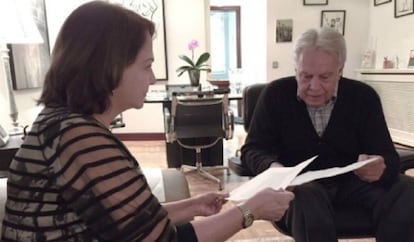Venezuela warns ex-Spanish PM may be banned from entering the country
Socialist veteran Felipe González wants to defend two jailed opposition leaders The Maduro government argues he has no authorization to practice law

Venezuela may block a visit by former Spanish prime minister Felipe González, who announced last month that he will defend two key opposition leaders who are currently being held in a military prison.
Since González decided to take up the cases of jailed activist Leopoldo López and Caracas Mayor Antonio Ledezma, various officials from the Venezuelan government have accused the former Spanish Socialist leader of “interfering” in the country’s internal affairs.
Venezuela has warned that González may have to apply for a work visa if he wants to defend opposition leaders
Even President Nicolás Maduro accused González of being part of an international conspiracy to overthrow his government.
And on Tuesday, a top government official said that the former prime minister will need to apply for a visa if he intends to “work as a consultant” in Venezuela.
Tarek William Saab, a former governor who now serves as ombudsman for the Maduro government, said it will be up to the judges who are presiding over both cases to decide whether they will allow González to help López and Ledezma in their defense.
“A foreigner – even a former prime minister – who wants to work as a consultant in Venezuela should have a work visa to practice that profession,” Saab wrote via his Twitter account.
González has said he wants to defend López and Ledezma, whom he described as “political prisoners,” because he was concerned about the deteriorating human rights conditions in Venezuela.
López is on trial for vandalism, rebellion and other charges related to the February 2014 nationwide anti-government protests that took place in various cities. His lawyers claim he has not been allowed to present any witnesses on his behalf during his closed-door trial.
Ledezma was arrested in February after Maduro accused him of conspiring to overthrow his government.
Both men are being held with about 90 other arrested members of the opposition at the Ramo Verde military prison outside Caracas.
González recently met with Ledezma’s wife Mitzy Capriles in Madrid.
Government officials, such as Calixto Ortega, deputy foreign minister for European affairs, have said that González would only be welcomed in Venezuela as long as he “came without plans to interfere.”
In any event, Ortega said, the final decision rests with Maduro “who decides foreign policy.”
The Venezuelan government has not publicly prohibited González from entering the country but comments made by other officials weigh toward that direction.
The previous Chávez government kicked out an HRW official and an ex-Peruvian presidential candidate
Ruling party Deputy Saúl Ortega, who serves as chairman of the foreign relations committee in the National Assembly, suggested that González is hoping to establish a foreign government in Venezuela.
“If a person wants to come as a proconsul to interfere with a country’s internal affairs, the least the government can do is send him back,” the chairman said.
It wouldn’t be the first time Venezuela has expelled a critic. During the government of the President Hugo Chávez, Human Rights Watch (HRW) director José Miguel Vivancos was kicked out of the country.
A former presidential candidate in Peru, Lourdes Flores was also ordered to leave after she compared Chávez to the deposed ex-President Alberto Fujimori.
Maduro government officials have also said that González cannot practice law in Venezuela because he doesn’t hold a local license or is not a member of the Venezuelan Bar Association.
“He has no authorization to practice law in Venezuela or to meddle in the internal affairs of this country,” said Foreign Minister Delcy Rodríguez. “So I would recommend that if his other businesses have failed [...] he should look for another way to make a living.”
Tu suscripción se está usando en otro dispositivo
¿Quieres añadir otro usuario a tu suscripción?
Si continúas leyendo en este dispositivo, no se podrá leer en el otro.
FlechaTu suscripción se está usando en otro dispositivo y solo puedes acceder a EL PAÍS desde un dispositivo a la vez.
Si quieres compartir tu cuenta, cambia tu suscripción a la modalidad Premium, así podrás añadir otro usuario. Cada uno accederá con su propia cuenta de email, lo que os permitirá personalizar vuestra experiencia en EL PAÍS.
En el caso de no saber quién está usando tu cuenta, te recomendamos cambiar tu contraseña aquí.
Si decides continuar compartiendo tu cuenta, este mensaje se mostrará en tu dispositivo y en el de la otra persona que está usando tu cuenta de forma indefinida, afectando a tu experiencia de lectura. Puedes consultar aquí los términos y condiciones de la suscripción digital.








































